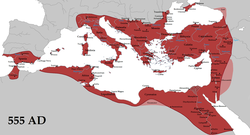ಬೈಝೆಂಟೈನ್ ಸಾಮ್ರಾಜ್ಯ
| ಈ ಲೇಖನ ಒಂದು ಚುಟುಕು. ಇದರ ಬಗ್ಗೆ ಹೆಚ್ಚಿನ ಮಾಹಿತಿ ತಿಳಿದಿದ್ದಲ್ಲಿ, ನೀವು ಈ ವಿಷಯವನ್ನು ವಿಸ್ತರಿಸಿ ಕನ್ನಡ ವಿಕಿಪೀಡಿಯ ಯೋಜನೆಯನ್ನು ಉತ್ತಮಗೊಳಿಸುವಲ್ಲಿ ಸಹಕರಿಸಬಹುದು. |
ಬೈಜಾಂಟೈನ್ ಸಾಮ್ರಾಜ್ಯ ಅಥವಾ ಪೂರ್ವ ರೋಮನ್ ಸಾಮ್ರಾಜ್ಯವು, ರೋಮನ್ ಚಕ್ರಾಧಿಪತ್ಯದ ಭಾಗವಾಗಿದ್ದು , ಕ್ರಿ.ಶ ೩೩೦ರಲ್ಲಿ ಕಾನ್ಸ್ಟಂಟಿನೋಪಲ್ ನಗರವನ್ನು ತನ್ನ ರಾಜಧಾನಿಯಾಗಿ ಅಭಿವೃದ್ಧಿ ಪಡಿಸಿತು.
| ಬೈಝೆಂಟೈನ್ ಸಾಮ್ರಾಜ್ಯ | ||||||
| Βασιλεία Ῥωμαίων Basileía Rhōmaíōna Imperium Romanum | ||||||
| ||||||
| ||||||
 | ||||||
| ರಾಜಧಾನಿ | Constantinopleb | |||||
| ಭಾಷೆಗಳು | ||||||
| ಧರ್ಮ | Christianity (Eastern Orthodox) (tolerated after the Edict of Milan in 313; state religion after 380) | |||||
| ಸರ್ಕಾರ | Autocratic monarchy | |||||
| Notable emperors | ||||||
| - | c. 330–337 | Constantine I | ||||
| - | 457–474 | Leo I | ||||
| - | 527–565 | Justinian I | ||||
| - | 610–641 | Heraclius | ||||
| - | 976–1025 | Basil II | ||||
| - | 1081–1118 | Alexius I | ||||
| - | 1259–1282 | Michael VIII | ||||
| - | 1449–1453 | Constantine XI | ||||
| ಐತಿಹಾಸಿಕ ಯುಗ | Late Antiquity to Late Middle Ages | |||||
| - | Partition of the Roman Empire | 285 | ||||
| - | Founding of Constantinople | 330 | ||||
| - | Death of Theodosius I | 395 | ||||
| - | Nominal end of the Western Roman Empire | 476 | ||||
| - | Fourth Crusade | 1204 | ||||
| - | Reconquest of Constantinople | 1261 | ||||
| - | Fall of Constantinople | 29 May 1453 | ||||
| - | Fall of Trebizond | 15 August 1461 | ||||
| - | Fall of Principality of Theodoro | December 1475 | ||||
| Population | ||||||
| - | 565 AD est. | ೨೬,೦೦೦,೦೦೦c | ||||
| - | 780 AD est. | ೭,೦೦೦,೦೦೦ | ||||
| - | 1025 AD est. | ೧೨,೦೦೦,೦೦೦ | ||||
| ಚಲಾವಣೆ | Solidus, Hyperpyron and Follis | |||||
| a. | ^ Βασιλεία Ῥωμαίων may be transliterated in Latin as [Basileia Rhōmaiōn] Error: {{Transliteration}}: unrecognized language / script code: grc-Latn (help), meaning Roman Empire. | |||||
| b. | ^ Between 1204 and 1261 there was an interregnum when the Empire was divided into the Empire of Nicaea, the Empire of Trebizond and the Despotate of Epirus, which were all contenders for rule of the Empire. The Empire of Nicaea is considered the legitimate continuation of the Byzantine Empire because they managed to re-take Constantinople. | |||||
| c. | ^ See Population of the Byzantine Empire for more detailed figures taken provided by McEvedy and Jones, Atlas of World Population History, 1978, as well as Angeliki E. Laiou, The Economic History of Byzantium, 2002. | |||||
🔥 Top keywords: ಕನ್ನಡಅಕ್ಕಮಹಾದೇವಿಮುಖ್ಯ ಪುಟಹನುಮ ಜಯಂತಿಕುವೆಂಪುಕನ್ನಡ ಅಕ್ಷರಮಾಲೆವಿಶೇಷ:Searchಕುಬೇರಕರಗಸಹಾಯ:ಲಿಪ್ಯಂತರಕನ್ನಡ ಗುಣಿತಾಕ್ಷರಗಳುಬಿ. ಆರ್. ಅಂಬೇಡ್ಕರ್ಗಾದೆಬಸವೇಶ್ವರಹನುಮಂತಗೌತಮ ಬುದ್ಧವೆಂಕಟರಮಣೇ ಗೌಡ (ಸ್ಟಾರ್ ಚಂದ್ರು)ಜ್ಞಾನಪೀಠ ಪ್ರಶಸ್ತಿ ಪುರಸ್ಕೃತ ಕನ್ನಡಿಗರುಸಾಮ್ರಾಟ್ ಅಶೋಕದ.ರಾ.ಬೇಂದ್ರೆಕರ್ನಾಟಕಹನುಮಾನ್ ಚಾಲೀಸಪರಿಣಾಮವಿಶ್ವ ಪುಸ್ತಕ ಮತ್ತು ಕೃತಿಸ್ವಾಮ್ಯ ದಿನಭಾರತದ ಸಂವಿಧಾನಹಲ್ಮಿಡಿ ಶಾಸನರಾಜ್ಕುಮಾರ್ಕರ್ನಾಟಕದ ಜಿಲ್ಲೆಗಳುಕನ್ನಡ ಸಾಹಿತ್ಯಆರ್ಯರುಸಮುದ್ರಗುಪ್ತಕನಕದಾಸರುಶಿವರಾಮ ಕಾರಂತರಾಮಾಯಣರಾಮಲೋಕಸಭೆಕರ್ನಾಟಕದ ಇತಿಹಾಸಕರ್ನಾಟಕದ ನದಿಗಳುಮಾಸ್ತಿ ವೆಂಕಟೇಶ ಅಯ್ಯಂಗಾರ್

